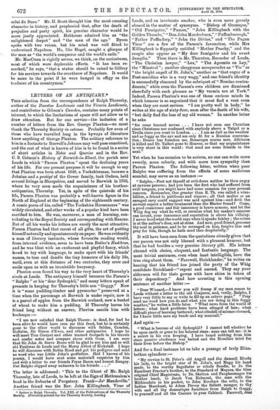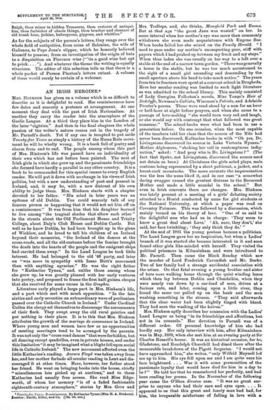LETTERS OF AN ANTIQUARY.*
Tins selection from the correspondence of Ralph Thoresby, author of the Dutatus Leocliensis and the Vicaria Leodiensis, and contributor to Gibson's Camden, contains many points of interest, to which the limitations of space will not allow us to draw attention. But for one service—the inclusion of a number of letters from the Rev. George Plaxton—we must thank the Thoresby Society in =tens°. Probably few even of those who have travelled long in the byways of literature know anything of George Plaxton. The solitary reference to him in a footnote to Boswell's Johnson may well pass unnoticed, and the rest of what is known of him is to be found in a series of short articles in Notes and Queries and in the Rev. C. S. Colman's History of Barwick-in-B(2mi, the parish near Leeds in which "Parson Plaxton" spent the declining years of his life. For our present purpose it will be enough to say that Plaxton was born about 1648, a Yorkshireman, became a Johnian and a protégé of the Gower family, took Orders, held several livings in Shropshire, and moved to Barwick in 1703, where he very soon made the acquaintance of his brother.. antiquarian, Thoresby. Yet, in spite of the quietude of his life, Parson Plaxton was probably a well-known figure in the North of England at the beginning of the eighteenth century. A comic poem of his, called " The Yorkshire Horseracers " was widely circulated, and other works of a popular kind have been ascribed to him. He was, moreover, a man of learning, con- tributing to the Royal Society and corresponding with Hearne. But of all his works his letters are surely the most attractive. Parson Plaxton had that rarest of all gifts, the art of putting himself naturally and spontaneously on paper. Hewes evidently a man of literary instincts, whose favourite reading would, from internal evidence, seem to have been Butler's Heutibras, and he was blest with an exuberant and playful fancy, which loved to toy with language, to make sport with his friends' names, to toss and dandle the tiny humours of his daily life, until, even at this distance of two centuries, they crow and smile upon us with an irresistible buoyancy.
Plaxton soon found his way to the very heart of Tboresby's circle at Leeds. The antiquary himself becomes the Parson's " Ralph° " or his "dear Sydrophil," and many letters speak of presents in keeping for Thoresby's little son "Goggy." Now it is " some pudding-timber and pyemortar " preserved at a time when the parsonage at Barwick is under repair, now it is a parcel of apples from the Barwick orchard, now a bushel of wheat to make him a pudding. If Thoresby leaves his friend long without an answer, Plaxton assails him with burlesque :—
"I am now satisfied that Ralph Thores : is dead, for had he been alive he would have seen me this frost, but he is certainly gone to the other world to discourse with Selden, Camden, Goltzins, Sir Simon d'Ewes, and other antiquaries. I hope he will meet Tom Corryat and other learned footpads in his travels and confer notes and compare shoes with them. I am sure that Sir John de Saevo Bosco will be glad to see him and so will old Pardinus de Leeds and the Merry Abbot of Kirkstall. I hope he will discourse with Robin Hood and get his pedigree and send as word who was Little John's godfather. Had I known of his journy, I would have sent some materiall enquiries by him and writ a letter to our friends Fryer Bacon and honest Bungey. But Ralph° slipped away unknown to his friends. . . ."
The letter is addressed: "This to the Ghost of Mr. Ralph Thoresby, late of Leeds, to be left at the Sign of Methusalem's head in the Suburbs of Purgatory. Frank—Jo' Mandeville." Another friend was the Rev. John Killingbeck, Vicar of
• Leltsre to Ralph Moresby. Vol. III. of the Publications of the Thoreeby Society. (Privately printed for the Thoresby Society, Leeds.)
Leeds, and an inveterate smoker, who is even more grossly abused in the matter of synonyms. " Bishop of Orenoque," "Old 'Fumigator," " Fomus," "John Killingbeck with the Golden Th umbs," " Don John Murderburn,"," Puffenborough," "Father Puffiudorp," "John the Divine," and "The Pagan Vicar" are a few of the Parson's favourites, while Mrs Killingbeck is flippantly entitled "Mother Peachy," and the couple also appear as " My dear fumigator and his sweet dumplin." Then there is. Mr. Thornton, Recorder of Leeds, "The Christian lawyer," "Lex," "The Aprentis en Ley," the "Minstrel "; another clergyman masquerades as " Vis " or "the bright angell of St. John's," another as "that rogue of a Post-meridian who is a very wagg," and one friend's identity is successfully obscured by the sobriquet of " Nemine contra- dicente," while even the Parson's own children are dismissed cheerfully with such phrases as " My vermin are at York." Indeed, Parson Plaxton's was one of those curious minds in which humour is so engrained that it mast find a vent even when they are most serious. "I am pretty well in body," he writes at the age of sixty-four, soon after the death of his wife, "but daily find the loss of my old woman." In another letter he asks
"for some learned newse. . . I have not seen one Christian since Christmas nor confessed with anybody above a Talgol or a Trulla since you went to London. . . I am as dull as the weather and as foggy as the ayr and am only fit for a Russian conversa- tion Demos has forsaken me, Bonaerges scorns mee, Atkinson is killed and Dr. Talbot gone to Heaven, so that my acquaintance is very short in this world God send me some friends in the next."
Yet when be has occasion to be serious, no one can write more sweetly, more soberly, and with more true sympathy than Parson Plaxton. The following letter, written when poor Ralpho was suffering from the effects of some malicious scandal, may serve as an instance :—
"Italpho,—Fret not thyself at evil-doers neither be thou angry at envious persons ; had you been the first who had suffered from evill tongues, you might have had some occasion for your present concern. Remember, One greater than R. Th. was called a wine- bibber, a friend to publicans and sinners ; all that malice or an enraged envy could suggest was said against him—and cloth the servant expect a better treatment than the Master found P Come, a good conscience and fair innocency is brave armour, and let the Whig dog say what he will, or surmise what his canker's rancour can invent, your innocence and reputation is above his villainy. I never heed what the world says when it speaks falsley ; the crime is at the author's door, not at mine. And now, good friend, possesso thy soul in patience, and to be revenged on him, forgive him and pray for him, though he bath used thee despitefully."
It will have been seen from the quotations already given that our parson was not only blessed with a pleasant humour, but that he bad besides a very genuine literary gift. His letters abound with choice, eloquent, and fantastic language. The most trivial sentences, even when least intelligible, have the tree ring about them. "Farewell, Stricklander," he writes on bearing that his friend has joined the party of the Whig candidate Strickland—" repent and amend. They say your aldermen will fur their gowns with hare skins in token of their dependency." And how arresting is this opening sentence of another letter :— "Dear Wizzard,—I know you will frump if my man comes to Leeds without a letter to the old Conjurer, and, verily, Ralph°, I have very little to say or write to fill up an octavo page." " Pray send me word how you do and what you are doing in this foggy weather," he writes a little later. " What news from the world of letters ; what hard problems have been attaqed of late; what difficult piece of learning battered; what citadell of science stormed, for I know little save my beads and my manual]."
And again:— "What is become of old Sydrophil P I cannot tell whether he be upon earth or gone to his beloved stars : none can tell me it is a secret in his own keeping. I have heard nothing from him since passive obedience was baited and the Homilies tried for their lives before the Bishop."
And for a final instance let us take a passage of truly Eliza. bethan splendour :—
"My service to St. Peter's old Angell and the damsell Rhoda his lady, to the bright star of St. John's, and Megg his hand made, to the worthy flagellater or schole Beadle, to Jo the Excellent Praetor's brother, to the Standard of Mayors, the blue original Chief Magistrate, to Dr. Skelton and Penpharmager his brother leech, to Jacob Van Belmont, the man with the Mithiradate in his pocket, to John Kershaw the solic, to the Indian Merchant, to Adam Pirvey the Sallett monger, to thy wife and all thy domestiqtte furniture from Ralph to Goggy, to yourself and all the Caesars in your Cabinet. Farewell, dear
Ralph, thou miner in hidden Treasures, thou restorer of antiqui- ties, thou furbisher of obsole things, thou brusher and cleanser of old trunk hose, jerkins, habergeons, gippons, and whittles."
As for the subjects of the parson's letters, they range over the whole field of antiquities, from coins of Selenium, the wife of Galienus, to Pope Joan's slipper, which he honestly believed himself to possess; from an investigation of the origin of bats to a disquisition on Florence wine ("'tis a good wine but apt to prick.. .."). And whatever the theme the writing is equally vivacious. The editor of this selection tells us that there is a whole packet of Parson Plaxton's letters extant. A volume of them would surely be certain of a welcome.



























































 Previous page
Previous page